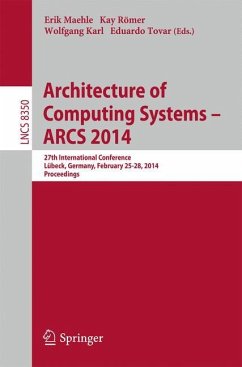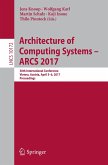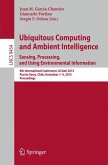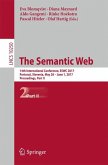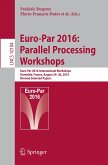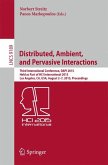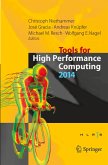Architecture of Computing Systems -- ARCS 2014
27th International Conference, Lübeck, Germany, February 25-28, 2014, Proceedings
Herausgegeben:Maehle, Erik; Römer, Kay; Karl, Wolfgang; Tovar, Eduardo
Architecture of Computing Systems -- ARCS 2014
27th International Conference, Lübeck, Germany, February 25-28, 2014, Proceedings
Herausgegeben:Maehle, Erik; Römer, Kay; Karl, Wolfgang; Tovar, Eduardo
- Broschiertes Buch
- Merkliste
- Auf die Merkliste
- Bewerten Bewerten
- Teilen
- Produkt teilen
- Produkterinnerung
- Produkterinnerung
This book constitutes the proceedings of the 27th International Conference on Architecture of Computing Systems, ARCS 2014, held in Lübeck, Germany, in February 2014. The 20 papers presented in this volume were carefully reviewed and selected from 44 submissions. They are organized in topical sections named: parallelization: applications and methods; self-organization and trust; system design; system design and sensor systems; and virtualization: I/O, memory, cloud; dependability: safety, security, and reliability aspects.
Andere Kunden interessierten sich auch für
![Architecture of Computing Systems - ARCS 2017 Architecture of Computing Systems - ARCS 2017]() Architecture of Computing Systems - ARCS 201738,99 €
Architecture of Computing Systems - ARCS 201738,99 €![Ubiquitous Computing and Ambient Intelligence. Sensing, Processing, and Using Environmental Information Ubiquitous Computing and Ambient Intelligence. Sensing, Processing, and Using Environmental Information]() Ubiquitous Computing and Ambient Intelligence. Sensing, Processing, and Using Environmental Information38,99 €
Ubiquitous Computing and Ambient Intelligence. Sensing, Processing, and Using Environmental Information38,99 €![Mobile and Ubiquitous Systems: Computing, Networking, and Services Mobile and Ubiquitous Systems: Computing, Networking, and Services]() Mobile and Ubiquitous Systems: Computing, Networking, and Services35,99 €
Mobile and Ubiquitous Systems: Computing, Networking, and Services35,99 €![The Semantic Web The Semantic Web]() The Semantic Web38,99 €
The Semantic Web38,99 €![Euro-Par 2016: Parallel Processing Workshops Euro-Par 2016: Parallel Processing Workshops]() Euro-Par 2016: Parallel Processing Workshops77,99 €
Euro-Par 2016: Parallel Processing Workshops77,99 €![Distributed, Ambient, and Pervasive Interactions Distributed, Ambient, and Pervasive Interactions]() Distributed, Ambient, and Pervasive Interactions39,99 €
Distributed, Ambient, and Pervasive Interactions39,99 €![Tools for High Performance Computing 2014 Tools for High Performance Computing 2014]() Tools for High Performance Computing 201438,99 €
Tools for High Performance Computing 201438,99 €-
-
-
This book constitutes the proceedings of the 27th International Conference on Architecture of Computing Systems, ARCS 2014, held in Lübeck, Germany, in February 2014. The 20 papers presented in this volume were carefully reviewed and selected from 44 submissions. They are organized in topical sections named: parallelization: applications and methods; self-organization and trust; system design; system design and sensor systems; and virtualization: I/O, memory, cloud; dependability: safety, security, and reliability aspects.
Produktdetails
- Produktdetails
- Theoretical Computer Science and General Issues 8350
- Verlag: Springer / Springer International Publishing / Springer, Berlin
- Artikelnr. des Verlages: 978-3-319-04890-1
- 2014
- Seitenzahl: 264
- Erscheinungstermin: 5. Februar 2014
- Englisch
- Abmessung: 235mm x 155mm x 15mm
- Gewicht: 406g
- ISBN-13: 9783319048901
- ISBN-10: 3319048902
- Artikelnr.: 40316102
- Herstellerkennzeichnung
- Springer Nature c/o IBS
- Benzstrasse 21
- 48619 Heek
- Tanja.Keller@springer.com
- Theoretical Computer Science and General Issues 8350
- Verlag: Springer / Springer International Publishing / Springer, Berlin
- Artikelnr. des Verlages: 978-3-319-04890-1
- 2014
- Seitenzahl: 264
- Erscheinungstermin: 5. Februar 2014
- Englisch
- Abmessung: 235mm x 155mm x 15mm
- Gewicht: 406g
- ISBN-13: 9783319048901
- ISBN-10: 3319048902
- Artikelnr.: 40316102
- Herstellerkennzeichnung
- Springer Nature c/o IBS
- Benzstrasse 21
- 48619 Heek
- Tanja.Keller@springer.com
Prof. Dr. Wolfgang Karl ist seit 2003 Professor für Entwurf von Systemen in Hardware / Organisation Innovativer Rechnerstrukturen am Institut für Technische Informatik der Universität Karlsruhe (TH).
Der Schwerpunkt seiner wissenschaftlichen Interessen liegt auf dem Gebiet der Rechnerarchitektur, insbesondere dem Entwurf und der Organisation paralleler Systeme, ihrer Programmierung und ihrer Werkzeuge, Prozessorarchitekturen sowie dem Entwurf eingebetteter Systeme. Wolfgang Karl ist Autor von über 80 Fachpublikationen, darunter Monographien und Veröffentlichungen in Buchreihen und wissenschaftlichen Zeitschriften
Der Schwerpunkt seiner wissenschaftlichen Interessen liegt auf dem Gebiet der Rechnerarchitektur, insbesondere dem Entwurf und der Organisation paralleler Systeme, ihrer Programmierung und ihrer Werkzeuge, Prozessorarchitekturen sowie dem Entwurf eingebetteter Systeme. Wolfgang Karl ist Autor von über 80 Fachpublikationen, darunter Monographien und Veröffentlichungen in Buchreihen und wissenschaftlichen Zeitschriften
Resource-Aware Harris Corner Detection Based on Adaptive Pruning.- Victim Selection Policies for Intel TBB: Overheads and Energy Footprint.- Non-preemptive Scheduling of Real-Time Software TransactionalMemory.- Trust-Enhanced Self-configuration for Organic Computing Systems.- Estimation of Reward and Decision Making for Trust-Adaptive Agents in Normative Environments.- An Adaptive Personal Learning Environment Architecture.- Middleware for Dynamically Adaptive Systems.- Mahler: Sketch-Based Model-Driven Virtual Prototyping.- Formal Architecture Specification for Time Analysis.- Hardware APIs: A Software-Centric Approach for Automated Derivation of MPSoC Hardware Structures Based on Static Code Analysis.- uBuild: Automated Testing and Performance Evaluation of Embedded Linux Systems.- A Two-Tier Design Space Exploration Algorithm to Construct a GPU Performance Predictor.- A Sensor Network Architecture for Urban Traffic State Estimationwith Mixed Eulerian/Lagrangian Sensing Based on Distributed Computing.- From Smart Clothing to Smart Table Cloth: Design and Implementationof a Large Scale, Textile Pressure Matrix Sensor.- Performance Isolation Exposure in Virtualized Platforms with PCI Passthrough I/O Sharing.- 3D DRAM and PCMs in Processor Memory Hierarchy.- A Service-Oriented Architecture for Virtualizing Robots in Robot-as-a-Service Clouds.- Towards Code Safety with High Performance.- Detecting Compromised Programs for Embedded System Applications.- Independent Kernel/Process Checkpointing on Non-Volatile Main Memory for Quick Kernel Rejuvenation.
Resource-Aware Harris Corner Detection Based on Adaptive Pruning.- Victim Selection Policies for Intel TBB: Overheads and Energy Footprint.- Non-preemptive Scheduling of Real-Time Software TransactionalMemory.- Trust-Enhanced Self-configuration for Organic Computing Systems.- Estimation of Reward and Decision Making for Trust-Adaptive Agents in Normative Environments.- An Adaptive Personal Learning Environment Architecture.- Middleware for Dynamically Adaptive Systems.- Mahler: Sketch-Based Model-Driven Virtual Prototyping.- Formal Architecture Specification for Time Analysis.- Hardware APIs: A Software-Centric Approach for Automated Derivation of MPSoC Hardware Structures Based on Static Code Analysis.- uBuild: Automated Testing and Performance Evaluation of Embedded Linux Systems.- A Two-Tier Design Space Exploration Algorithm to Construct a GPU Performance Predictor.- A Sensor Network Architecture for Urban Traffic State Estimationwith Mixed Eulerian/Lagrangian Sensing Based on Distributed Computing.- From Smart Clothing to Smart Table Cloth: Design and Implementationof a Large Scale, Textile Pressure Matrix Sensor.- Performance Isolation Exposure in Virtualized Platforms with PCI Passthrough I/O Sharing.- 3D DRAM and PCMs in Processor Memory Hierarchy.- A Service-Oriented Architecture for Virtualizing Robots in Robot-as-a-Service Clouds.- Towards Code Safety with High Performance.- Detecting Compromised Programs for Embedded System Applications.- Independent Kernel/Process Checkpointing on Non-Volatile Main Memory for Quick Kernel Rejuvenation.

